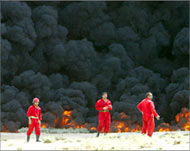Oil drops on Saddam capture
Oil prices have fallen by more than 2.5% on speculation that Iraq could export more oil if the capture of Saddam Hussein put an end to sabotage of the country’s production facilities and pipelines.

US light crude on the New York Mercantile Exchange (NYMEX) dropped 4% in opening trade to an intraday low at $31.74 a barrel, but recovered to $32.10 by 05:38 GMT, marking a loss of 94 cents.
London’s Brent crude lost 76 cents to $29.61 a barrel.
“NYMEX crude prices plunged on the belief that guerrilla attacks on the pipelines and oilfields will be restrained after Saddam Hussein was captured,” said Katsunori Watanabe, research director at Nihon Unicom Corp in Tokyo.
“Fund operators, who piled up their long positions massively on Friday, are now dumping them on expectations that there will be more stable crude supplies from Iraq after Saddam’s arrest,” Watanabe said.
Shamkhi Faraj, head of Iraq’s State Oil Marketing Organisation (SOMO), said on Sunday that Saddam’s arrest might improve security in the north of the country, allowing crude exports from the Kirkuk pipeline.
|
“His (Saddam’s) supporters will fall more into line with the mainstream, which will make it easier to secure the system (from sabotage)”
Shamkhi Faraj,
Head of Iraq’s State Oil Marketing Organisation |
“His supporters will fall more into line with the mainstream, which will make it easier to secure the system (from sabotage),” Faraj said.
Repeated sabotage attacks on the pipeline carrying oil from the Kirkuk fields to the Turkish Mediterranean have made it impossible for Baghdad to export crude and maximise oil revenues needed to fund reconstruction.
Iraq is now exporting about 1.5 million barrels per day (bpd) of Basra Light crude oil out of its southern Basra Oil Terminal. Oil Minister Ibrahim Bahr al-Uloum said earlier this month that Iraq planned to raise overseas sales to two million bpd by the end of the first quarter next year.
More attacks warned
In a televised address, US President George Bush warned that Saddam’s arrest did not mean the end of violence in Iraq.
“We still face terrorists who would rather go on killing the innocent than accept the rise of liberty in the heart of the Middle East,” Bush said.
Koji Suzuki, a manager at Star Futures Securities in Tokyo, said oil prices would easily turn higher if new attacks emerged.
 |
|
Analysts hope attacks like these |
“Temporarily, key NYMEX futures could test $34 on another view that supporters of Saddam Hussein could intensify terror
acts,” Suzuki said.
Gordon Kwan, oil and gas analyst at HSBC in Hong Kong said Monday’s price dip was unlikely to be the start of any trend downwards.
Saddam’s arrest did not alter strong supply and demand dynamics, he said.
“We are looking at a synchronised global recovery, which means improved oil demand in the US, China and Japan at a
time when supplies are tight,” Kwan said.
Saudi Arabia, the world’s biggest oil exporter, said on Saturday that current high oil prices were not due to any supply crunch.
“It has nothing to do with supply shortages or anything like that,” Saudi Oil Minister Ali al-Naimi said in Cairo.